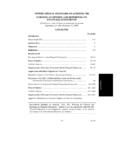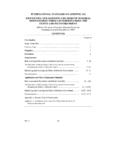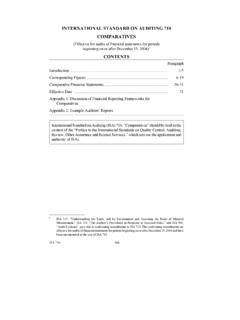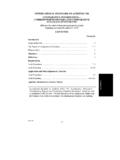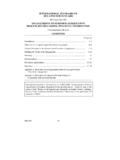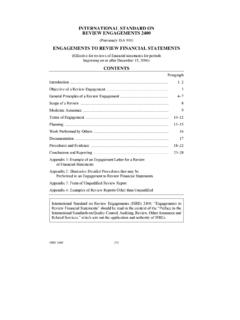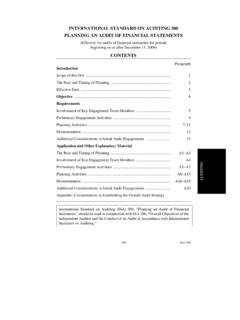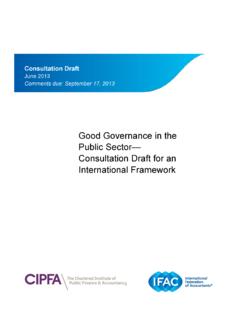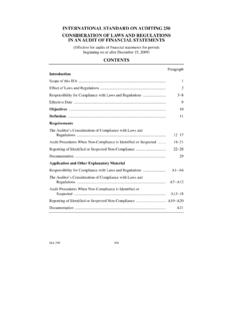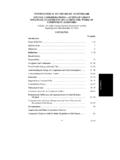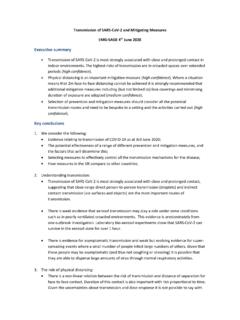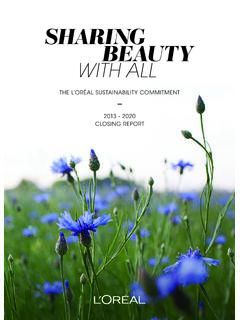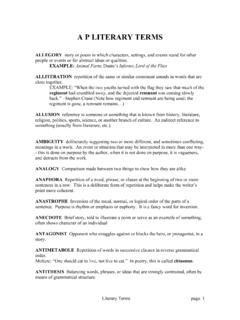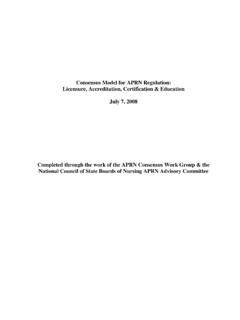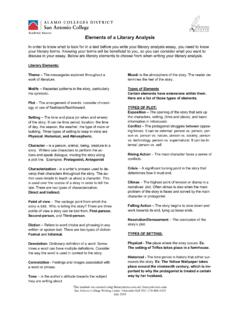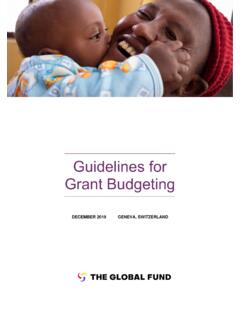Transcription of AUDIT QUALITY - IFAC
1 AUDIT QUALITYAN IAASB PERSPECTIVEJANUARY 2011 ENhANCINg AUDIT QUALITY IAASB CAG PAPER IAASB CAG Agenda (March 2011) Agenda Item AUDIT QUALITY Thought Piece The turbulent events of the global financial crisis have highlighted the critical importance of credible, high- QUALITY financial reporting. They have also demonstrated the importance of considering the role of AUDIT QUALITY in the broader context of QUALITY financial reporting. Achieving QUALITY financial reporting depends on the integrity of each of the links in the financial reporting supply one of those links, the external AUDIT plays a major role in supporting the QUALITY of financial reporting around the world, whether in the context of the capital markets, the public sector or the private or non-public sector.
2 It is an important part of the regulatory and supervisory infrastructure, and thus an activity of significant public interest. AUDIT QUALITY is therefore a matter of high importance for the IAASB is most directly involved in supporting AUDIT QUALITY through its International Standards on Auditing (ISAs) and International Standard on QUALITY Control (ISQC). These standards provide a foundation supporting high- QUALITY audits. However, it is important that the standards be recognized and understood as only one of several components influencing AUDIT QUALITY . Other influences, including user perceptions, the skills and competencies of auditors, the actions of others in the financial reporting supply chain, and the legal, regulatory and business environments, also play important parts in the debate on AUDIT QUALITY .
3 Because the context in which an AUDIT is undertaken is continually evolving to keep pace with changes in the business environment, financial reporting standards, regulation and technology, intrinsically an AUDIT is an activity that evolves over time. The pursuit of AUDIT QUALITY , therefore, is not a program with a definitive outcome. Rather, it is a process that ensures that, through continual improvements in its elements, AUDIT QUALITY evolves with the environment in which audits are performed. This means that the improvement of any one element of AUDIT QUALITY should not preclude efforts to seek further improvements in other elements. Different stakeholders are likely to have different views about what AUDIT QUALITY is and how it can be enhanced.
4 The IAASB believes that it is important to try to reach a common vision about this through stakeholders in particular, preparers, investors, regulators, auditors, those charged with governance, and other standard setters sharing their particular perspectives, and understanding and commenting on the perspectives of publication introduces a specific initiative of the IAASB to contribute to the debate on AUDIT QUALITY . It highlights several important perspectives on AUDIT QUALITY , as a means to stimulate thoughts and discussions amongst stakeholders in the financial reporting process. It also provides an indication of the IAASB s plans to consider pursuing a future project on AUDIT S MESSAgEAChIEVINg CLARITY2 IAASB CAG PAPER IAASB CAG Agenda (March 2011)
5 Agenda Item AUDIT QUALITY Thought Piece Investor PerspectiveAudit Committee Member PerspectiveAuditor ReportingAssessment of QUALITY of the AuditorAuditor ReputationAssessment of QUALITY of the AUDIT ProcessRelevance/Expectations of the AUDIT Auditor Communications and InteractionsPerceptions of AUDIT QualityThere have been a number of attempts to define AUDIT QUALITY in the past. However, none has resulted in a definition that has achieved universal recognition and acceptance. AUDIT QUALITY is, in essence, a complex and multi-faceted concept. AUDIT QUALITY is subject to many direct and indirect influences. While some may place more emphasis on the direct influences of AUDIT QUALITY , this perspective alone is not sufficient to address the question of whether AUDIT QUALITY has been achieved in the broader context.
6 Perceptions of AUDIT QUALITY vary amongst stakeholders depending on their level of direct involvement in audits and on the lens through which they assess AUDIT QUALITY . Variations in stakeholder perspectives of AUDIT QUALITY suggest that no single element should be assumed as having the dominant influence on AUDIT QUALITY . This implies that a broader and deeper understanding of the complexities and nuances of the topic needs to be developed through studying AUDIT QUALITY more holistically. It also implies that individual stakeholders should consider more carefully whether actions they endorse might have detrimental effects on others perspectives of AUDIT QUALITY .
7 Therefore, understanding each other s views and how one s actions may impact on others perceptions of AUDIT QUALITY is critical to efforts to enhance AUDIT ON AUDIT QUALITYP ossible perception of AUDIT QUALITY through an investor s lensPossible perception of AUDIT QUALITY through an AUDIT committee member s lens3 IAASB CAG PAPER IAASB CAG Agenda (March 2011) Agenda Item AUDIT QUALITY Thought Piece InputsContext FactorsOutputsAUDIT QUALITYC onceptually, one can view AUDIT QUALITY in terms of three fundamental aspects: inputs, outputs, and context factors.
8 There are many inputs to AUDIT QUALITY apart from auditing standards. One important input is the auditor s personal attributes such as auditor skill and experience, ethical values and mindset. Another important input is the AUDIT process. The AUDIT process concerns such matters as the soundness of the AUDIT methodology, the effectiveness of the AUDIT tools used, and the availability of adequate technical support, all geared toward supporting execution of a QUALITY AUDIT . Outputs of the AUDIT are also important influences on AUDIT QUALITY because often the outputs are considered by stakeholders in their assessments of AUDIT QUALITY . For example, the auditor s report is likely to be viewed as positively influencing AUDIT QUALITY if it clearly conveys the outcome of the AUDIT .
9 Equally, auditor communications to those charged with governance (TCWG) on matters such as qualitative aspects of the entity s financial reporting practices and deficiencies in internal control can positively influence AUDIT QUALITY . More broadly, there are context factors that also influence AUDIT QUALITY . For example, sound corporate governance facilitates AUDIT QUALITY , especially if it creates a climate of transparency and ethical behavior within the entity. Law and regulation also can positively influence AUDIT QUALITY if, inter alia, it creates a framework within which the AUDIT can be effectively conducted, as can regulatory oversight if it establishes an effective regime for monitoring the QUALITY of auditors work and there is effective dialogue between auditors and regulators.
10 Equally, the QUALITY of the applicable financial reporting framework can influence AUDIT QUALITY . For instance, use of a financial reporting framework that does not promote robust and transparent disclosures may adversely affect AUDIT QUALITY as well as related external perceptions. These are not one-way influences. For example, what the auditor communicates to TCWG may influence the actions and perspectives of TCWG relative to matters pertaining to the AUDIT . In turn, TCWG may influence the nature and focus of actions the auditor may take during the AUDIT . Likewise, regulators may have a direct influence over the process of setting auditing standards; in turn, the QUALITY of auditing standards may affect the nature and extent of regulation and oversight.
